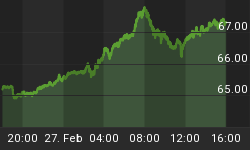Didn't Chairman Bernanke say, "The Federal Reserve will not monetize the debt."
Yes he did, as clear as day to the House Budget Committee back on June 3, 2009. And yet 17 months later Bernanke gave us QE II, which not only means the Federal Reserve will be purchasing about $75 billion a month in assets for the next 8 months, but as it so happens, some $110 billion in Treasury Notes and Bonds too. That's enough to finance the U.S. government's projected fiscal deficit right up through June 2011, in full.
The Contrarian Take says, what gives!
Echoing his June 3rd testimony, said Bernanke to Congressman Ron Paul and the House Financial Services Committee on July 21, 2009, "We are not intervening, or actively trying to... make it easier for the government to issue debt." Well, QE II may or may not be aimed at "monetizing the debt" but monetizing the debt, and in robust fashion, it nevertheless is.
We here at The Contrarian Take love to crunch numbers. So we asked the question, just how big are these debt monetization activities in the light of historical precedence? Given the impact these activities have on the currency and bond markets, we're thinking its something we all want to know. What we found is that these activities are a whole lot bigger and a whole lot more pervasive than even we thought.
Before we show you just how big and pervasive, some preliminaries...
Intro to U.S. Government Debt Monetization, Our Take
The traditional take on U.S. government debt monetization activities is centered on U.S. Treasury debt and the Federal Reserve. To wit, the Federal Reserve purchases or monetizes Treasury debt by issuing checks on itself, in effect printing the money with which to purchase the debt. Certainly true, but in our minds, too narrow a view for two reasons:
- Treasury debt is not the only government debt.
- The Federal Reserve is not the only central bank actively monetizing government debt.
Treasury Debt, Not the Only Government Debt
What other government debt is there, you ask? The obligations of the government-sponsored enterprises (Agencies) Fannie Mae and Freddie Mac.
On December 24th 2009, recognizing the dire state of the housing market, a market that just so happens to be dominated by the Agencies, the U.S. government gave the Agencies, already in conservatorship and under government control, unlimited access to the U.S. Treasury, effectively making them divisions of the U.S. government and their mounting losses the government's own. On that date, the long standing implicit guarantee bestowed on Agency debt by the U.S. Treasury was turned lock, stock and barrel into and an explicit one, making Agency debt obligations the defacto debt of the U.S. government.
In our minds, that means that when the Federal Reserve buys Agency debt, in a very real way, it is monetizing the debt of the U.S. government.
Click here to read the rest of the article















